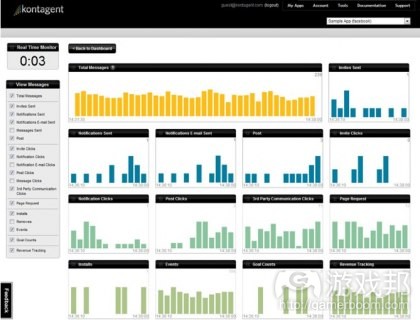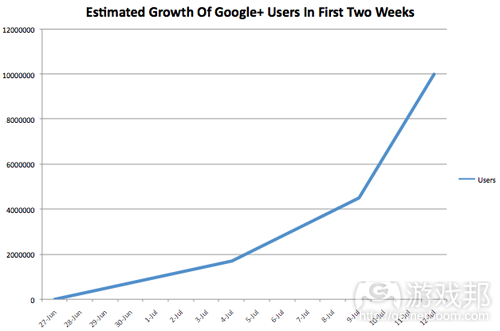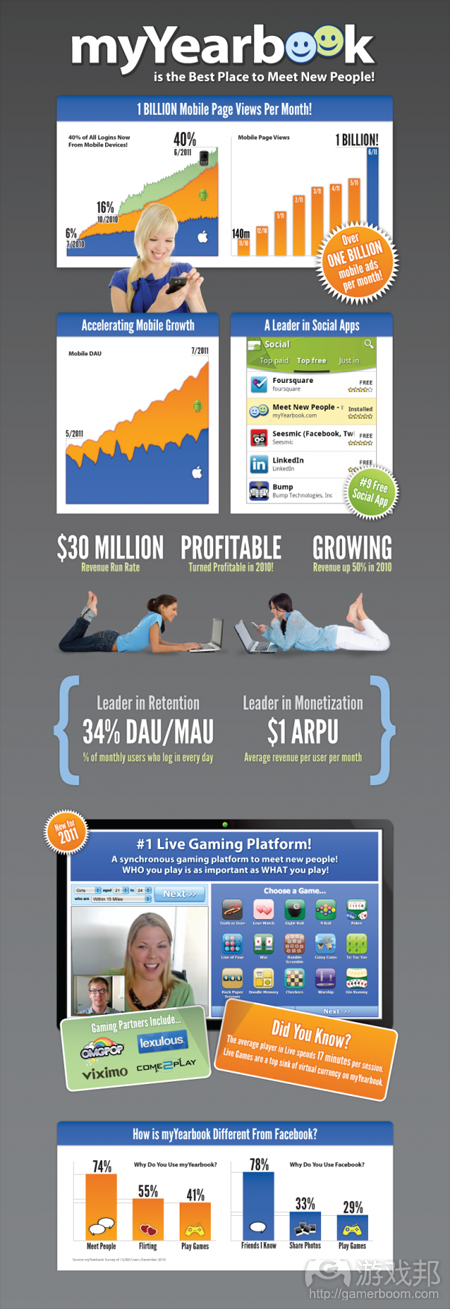每日观察:关注Google+用户或超1000万等消息(7.12)
1)据Venturebeat报道,视频游戏发行商EA日前以6.5亿美元现金加1亿美元股票收购了休闲游戏巨头PopCap公司,如果后者的业绩能够在2013年达标,EA还将再追加5.5亿美元,这笔收购交易额总计将达13亿美元左右。PopCap是EA在本月收购的第二家公司(游戏邦注:EA最近刚收购继Playfish之后的第二家社交游戏开发商Ohai),该公司联合创始人John Vechey称EA与PopCap联手是一个绝佳组合,他认为EA首席执行官John Riccitiello很了解游戏行业走向以及PopCap的特长。
2)Facebook已经拥有2.5亿以上的手机用户,日前又推出一款Java手机应用Facebook for Every Phone,支持2500种功能性手机用户使用该服务。这款应用拥有轻型News Feed,Facebook信息箱,以及直接从手机上传并分享照片的功能。用户可通过m.facebook.com或GetJar、Appia和Mobile Weaver等手机应用商店下载该应用。
为了鼓励用户使用这一服务,Facebook将替用户承担该应用前90天的数据流量费用。
3)Facebook应用及游戏分析平台Kontagent日前宣布向网页及手机应用领域进军,推出新服务kSuite,支持开发者在社交及手机应用平台实时追踪用户行为,并根据反馈参数判断应用或网页的用户粘性。Kontagent在Facebook平台每月追踪1亿以上的月活跃用户,以及150亿条信息,该服务覆盖用户在过去一年中增幅超过300%,其客户包括EA、索尼、育碧、Take Two、科乐美、完美世界、Gaia和腾讯等游戏公司。
4)EA创始人及Digital Chocolate首席执行官Trip Hawkins在日前的GamesBeat 2011大会上发言表示,与开放性平台相比,某些传统游戏平台运营者扼制了行业的创新性。
他称有许多杰出的公司从开放性平台中应运而生,任天堂是一个伟大而令人称奇的公司,但在过去25年中却没有哪一家大公司的崛起与之相关。开放性平台让游戏产业迎来了黄金时代,开发者将以自己的抉择证明哪一种平台才是最终赢家,他认为不少平台持有者都在以“口惠而实不至的自由来引诱开发者”,开发者应该将目光转向更为开放的浏览器系统。
5)Asiasoft Online的营销信息沟通主管Leslie Lin引用In-Stat最新数据称,2010年在线游戏及社交网络的虚拟商品交易营收超过70亿美元,并将在2014年双倍增长;亚洲地区占据2010年虚拟商品交易营收的70%份额,总共约49亿美元。
PopCap成员Bart Barden也指出,他预计2011年的这一市场规模将达22亿至25亿美元,比2010年增长将近40%。Pearl Research总经理Allison Luong表示,中国和韩国将成为亚洲虚拟商品交易的最大市场;虽然这两国游戏玩家付费比例不足5%–10%,但付费玩家基本上属于高消费用户,正是这一小部分群体在支持其他90%用户免费玩游戏。
6)传统游戏元老、视频游戏公司THQ首席执行官Brian Farrell在日前的GamesBeat 2011大会上发言表示,大型发行商如果希望在竞争中幸存下来,就得像初创企业一样卖力和谨慎。他称专属掌机游戏仍然还会有市场,但将遭遇其他游戏平台的激烈竞争,市场经验表明,用户希望体验可快速消化的游戏,而并不一定是极具深度的内容。
他认为下一代掌机游戏也许将不再专注于强大的画面和视觉效果,而是创建一个更易获取用户,鼓励他们以多种新方式互动的系统,例如微软Xbox 360 Kinect体感控制等。
7)Google+面世已有两周,虽然谷歌方面仍未公布该社交服务的具体注册用户数据,不过Ancestry.com创始人Paul Allen日前却发布了他自己的统计结果,并估计Google+用户可能已经超过1000万(游戏邦注:他统计Google+用户在7月4日是170万,7月9日则是450万左右)。
观察者认为假如这一数据无误,那就意味着Google+很可能成为史上发展速度最快的网站。
8)myYearbook是一家成立于2005年的社交网站,原先功能介于Facebook和约会网站之间,从去年开始走上了与Facebook有所不同的差异化道路,更为强调约会和游戏业务,并将移动领域视为运营重点。该网站目前共有2500万用户,其移动网站在6月份的综合浏览达到10亿次,而去年11月份则是1.4亿次。
其移动业务包括iPhone和Android应用版本,以及一个移动网站,这三者目前占据用户登录次数的40%,而一年前的这一比例仅为2%(游戏邦注:当时myYearbook刚在iPhone平台推出第一款手机应用)。myYearbook目的Android应用目前也是Android Market的前十名热门免费社交应用之一。
虽然该平台的Live Games功能尚未登陆手机版本,但myYearbook表示这是公司向手机游戏领域迈进的重要一环,他们将着力解决这一问题。(本文为游戏邦/gamerboom.com编译,如需转载请联系:游戏邦)
1)Electronic Arts buys PopCap for $750M
Dean Takahashi
Supergiant video game publisher Electronic Arts has acquired casual game maker PopCap for $650 million in cash and $100 million in stock. The deal includes a multi-year earn out bonus, but there were no details released about it.
PopCap cofounder John Vechey said in an interview with VentureBeat that Electronic Arts felt like a great match because John Riccitiello, CEO of Electronic Arts, is very knowledgeable about games and understands what PopCap is good at. Barry Cottle, head of EAi, the company’s mobile and casual game studio, said the deal is a smart one and that EA did not pay an excessive amount for PopCap.
PopCap has been adapting to the rapid rise of Facebook games and has 16.3 million monthly active users on the site. It has 4.3 million daily active users, or those who come back once a day, and it ranks No. 3 behind Zynga and Electronic Arts, according to AppData.(source:venturebeat)
2)Facebook Launches Free Mobile Apps On 2,500 Java Phones
Erick Schonfeld
With more than 250 million mobile users, Facebook knows that it has to be on every mobile phone in the planet to keep riding the social wave as the web becomes more mobile. And that means more than just being on iPhone and Android phones.
Today, Facebook is addressing the 2,500 feature phones out there that can download Java apps with a new app called Facebook for Every Phone. It includes a lightweight News Feed, an inbox for your Facebook Messages, and a way to upload and share photos directly from your phone. You can download it at m.facebook.com or mobile app stores like GetJar, Appia, and Mobile Weaver.
To get people to try it, Facebook will pay for the first 90 days worth of data the app uses. (Facebook designed it to be data efficient).(source:techcrunch)
3)Kontagent Expands Beyond Facebook To Offer Analytics To Web And Mobile Apps
Leena Rao
For the past few years, Kontagent, an fbFund winner and social analytics platform, has offered user analytics for developers of Facebook apps and games. Today, the company is moving beyond the social network to web and mobile apps that have not been built off the Facebook platform.
As we’ve written in the past, Kontagent’s real-time platform gives Facebook app developers, game studios and publishers detailed data of demographics based on geographic location, age groups, gender, user engagement times, social event interaction and other variables. The new version allows developers to track and optimize advertising efforts, user virality, in-app mechanics, virtual goods, currency monetization, and more.
Called kSuite, Kontagent’s data analysis platform can now identify usage patterns on social and mobile apps in real time. The platform measures data by event and custom inputs, and examines how virality of an application or website.
Kontagent has been able to scale its analytics platform on Facebook, so it should be interesting to see how the startup performs outside of the social network. Kontagent tracks over 100 million monthly active users and over 15 billion messages per month on Facebook. Its monthly active user base has increased by over 300% in the past 12 months and counts a number of well known game developers as clients, including EA, Sony, Ubisoft, Take2, THQ, Konami, Perfect World, Gaia and Tencent. (source:techcrunch)
4)Hawkins: Platform Holders Offer ‘False Promises Of Freedom’
by Colin Campbell
Electronic Arts founder Trip Hawkins accused Nintendo of presiding over a “feudal dark age” in the game industry in which developers “don’t own the land that they are tilling.”
At the Gamasutra-attended GamesBeat 2011 in San Francisco today, the founder and CEO of social game company Digital Chocolate spoke passionately about the power of platform holders and how they limit creativity in comparison to open platforms.
“Look at the world wide web and how many great companies have been built on that open platform,” he said. “Nintendo is a great, amazing company, but how many companies have been built on the back of Nintendo’s platform in the past 25 years?”
He said that the games industry had been born in a golden age of open platforms, and that EA had prospered because it had ignored Nintendo and focused on the Sega Genesis, which it reverse engineered. “We fought for our freedom. We didn’t accept the feudal system.”
He added, “There is no question that there is a war going to win the hearts and minds of the developers. They will decide which feudal lord wins or loses. The days of floating your boat on one platform are over. The question is, do you as a developer, own the dirt?”
He said that platform holders “lure [developers] in with false promises of freedom” and argued that that developers should “focus on the browser,” an open system.(source:gamasutra)
5)Online games, social networks drive virtual goods
By Kevin Kwang
The virtual goods market continues on an upward growth curve as more revenue is generated from new subscribers on social networking sites and online games that can be accessed on the go from mobile devices, industry insiders said.
Leslie Lin, marketing communications manager at Asiasoft Online, for one, said the virtual goods revenue globally is growing, powered by the increasing popularity of online games and social networking. Citing figures from research firm In-Stat, he said the virtual goods revenue from online games and social networking exceeded US$7 billion in 2010 and will more than double by 2014.
Asia accounted for about 70 percent of the 2010 revenue, or about US$4.9 billion, he added in his e-mail.
Explaining this growth, Lin said the emergence of social and casual games on social networking sites and more advanced mobile phones that can access these games have helped create “a new virtual goods market with rapid growth”.
“Users buy virtual goods in different types of online games such as massive multiplayer online role-playing games (MMORPGs), first-person shooters (FPSs) and casual games for three main reasons: status, socializing and winning,” he said. “And because virtual goods are a core part of the overall product and social experience, [the] demand will remain high.”
Another industry watcher, PopCap’s Bart Barden, agreed with Lin, pointing to social games on Facebook or other social networks and mobile platforms as the “biggest channels” for virtual goods consumption over the next 24 months. The director of online business for the social games publisher also noted that Europe and Asia-Pacific are “higher growth candidates”, driven primarily by the increasing user base on Facebook and other social networks in these regions.
While PopCap has not conducted specific studies on the virtual goods market as a whole, Barden told ZDNet Asia in his e-mail that several of his sources have quoted the industry size to be somewhere between US$2.2 billion and US$2.5 billion in 2011, an increase of almost 40 percent from 2010.
Asia’s ardor for online games Zooming in on Asia, Allison Luong, managing director of Pearl Research, said China and South Korea are the biggest markets for virtual goods in Asia.
In an e-mail, the executive pointed out that less than 5 to 10 percent of gamers in these two countries pay for virtual goods. However, these paying gamers tend to be high-spenders and their devotion to the games mean they will help support the other 90 percent of gamers that play for free, she added.(source:zdnetasia)
6)THQ CEO: big game companies have to act like a startups to survive
Matthew Lynley
THQ is a well-established company that has dozens of years of experience making video games, but it now has a market cap smaller than the valuation of social games site Zynga. That’s caused the company to rethink its strategy — to be more like a startup — said THQ chief executive Brian Farrell.
“You really have to act like a startup, think like a startup within the company in order to survive,” Farrell said.
Farrell is the longtime chief executive of THQ, the publicly traded video game publisher based in Calabasas, Calif. His company is in the midst of a turnaround effort as it focuses on better, higher-quality games like many other large rivals in the video game business. And at times it hasn’t communicated that it is competing effectively in the mobile arena, Farrell said. He made the comments on stage today at VentureBeat’s GamesBeat 2011 conference in San Francisco.
For mobile devices, THQ is working on better bite-size games — like those on the iPhone and Android devices — rather than massive titles with awesome graphics on hand-held consoles like Sony’s PlayStation Vita or the Nintendo 3DS. The market is demanding more titles that are around $1 or free-to-play rather than expensive handheld titles in the mobile arena, Farrell said.
“The dedicated handheld market is going to find an audience, but it isn’t going to be as broad because of the competition from other operating systems,” he said. “What the market is telling us, is consumers want a very quickly consumable mobile experience; it doesn’t necessarily have to be deep.”
THQ is making big bets on titles such as Saints Row the Third, Metro Last Light, Margaritaville, Space Marine, and others. Farrell is a good-humored executive who is doubling down on big titles and is expanding into new digital games. We met up with him for an interview at the E3 trade show in Los Angeles last week, where the company showed off a bunch of major titles.
Farrell said the next generation of video game consoles probably won’t focus on being powerful and having great graphics. Instead, the focus will be on building an ecosystem that is more accessible and lets players interact with games in new ways — like through the use of motion controls like Microsoft’s Xbox 360 Kinect controller, or different types of controllers.(source:venturebeat)
7)Google+ Estimated To Surge Past 10 Million Users
Erick Schonfeld
It’s only been two weeks since the launch of Google+ , but already there are “millions” of users, according to chairman Eric Schmidt. Beyond that ballpark figure, Google has not disclosed any user or usage numbers.
But Ancestry.com founder Paul Allen has been publishing his own estimates of the growth of Google+ (on Google+ itself). His latest estimate is that Google+ will surpass 10 million users today, only two weeks after its launch. That estimate is up from 4.5 million on July 9 and 1.7 million on July 4. I’ve charted the growth above, with Allen’s numbers.
If these numbers are anywhere near accurate, Google+ could very well become the fastest growing product in the history of the Web. Then again, Google is simply turning on the product for the hundreds of millions of users it already has once they get an invite and sign up.(source:techcrunch)
8)MyYearbook chases engagement, games and mobile for social networking success
By Ryan Kim
Tweet inShare20Chances are you haven’t heard of myYearbook, a social networking site that sits somewhere between Facebook and dating sites. But the company turned profitable last year and has seen its growth soar, in part by emphasizing engagement and games with an increasing focus on mobile.
MyYearbook, which was founded in 2005, shared some statistics today about how its business has grown in the last year, especially on mobile, showing that the company is surviving amidst larger competitors by focusing on its core offering: Helping people meet others and stay engaged with each other. The company, with 25 million members, said it has hit 1 billion mobile page views in June, up from 140 million in November last year. The mobile business, which is made up of iPhone and Android apps along with a mobile web site, now accounts for 40 percent of all log-ins, up from 2 percent a year ago, when myYearbook launched its first mobile app on the iPhone. And myYearbook’s Android app has also hit the top ten on Android Market for free social apps.
The growth has helped MyYearbook turn profitable and put it on a $30 million annual run rate. And it proves that the company can compete without taking Facebook and others head on. MyYearbook has done this by emphasizing social discovery, helping users find each other and stay connected to them. The service allows people to see user activity in a feed that can be organized by location, age, and gender. Users can then interact with each other by sharing information and pictures, playing games with each other or throwing out questions through a Quora-like Q&A feature called Ask Me. One of the more unique tools is a feature called Live Games that launched late last year that lets people video chat while playing games together in real-time. The average player now spends 17 minutes per Live Games session.
While features like Live Games aren’t available on mobile, it’s something myYearbook is looking at as part of a larger push on mobile gaming. The company bought a handful of Android games earlier this year with the intention of offering the games to mobile users and tying the experience together with myYearbook through a social layer. The hope is to offer many of the games across all platforms so users can interact without barriers.(source:gigaom)















































